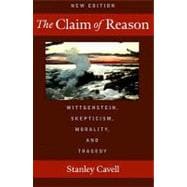
Note: Supplemental materials are not guaranteed with Rental or Used book purchases.
Purchase Benefits
What is included with this book?
| Foreword | p. xv |
| Wittgenstein and the Concept of Human Knowledge | |
| Criteria and Judgment | p. 3 |
| Criteria and Skepticism | p. 37 |
| Austin and Examples | p. 49 |
| What a Thing Is (Called) | p. 65 |
| Natural and Conventional | p. 86 |
| Normal and Natural | p. 111 |
| Skepticism and the Existence of the World | |
| The Quest of Traditional Epistemology: Opening | p. 129 |
| The Reasonableness of Doubt | p. 130 |
| The Appeal to Projective Imagination | p. 145 |
| The Irrelevance of Projective Imagination as Directed Criticism | p. 154 |
| A Further Problem | p. 159 |
| Excursus on Wittgenstein's Vision of Language | p. 168 |
| Learning a Word | p. 169 |
| Projecting a Word | p. 180 |
| The Quest of Traditional Epistemology: Closing | p. 191 |
| The Philosopher's Ground for Doubt Requires Projection | p. 194 |
| The Philosopher's Projection Poses a Dilemma | p. 199 |
| The Philosopher's Basis; and a More Pervasive Conflict with His New Critics | p. 204 |
| The Philosopher's Context Is Non-claim | p. 217 |
| The Philosopher's Conclusion Is Not a Discovery | p. 221 |
| Two Interpretations of Traditional Epistemology; Phenomenology | p. 225 |
| The Knowledge of Existence | p. 231 |
| Knowledge and the Concept of Morality | |
| Knowledge and the Basis of Morality | p. 247 |
| An Absence of Morality | p. 274 |
| Rules and Reasons | p. 292 |
| Promising and Punishing | p. 293 |
| Play and the Moral Life | p. 303 |
| The Autonomy of Morals | p. 313 |
| Skepticism and the Problem of Others | |
| Between Acknowledgment and Avoidance | p. 329 |
| The parable of the boiling not | p. 332 |
| The private language argument | p. 343 |
| The allegory of words; interpretation; seeing something as something | p. 354 |
| Seeing human beings as human beings | p. 370 |
| Embryos | p. 373 |
| Slaves | p. 375 |
| Soul-blindness | p. 378 |
| The human guise | p. 380 |
| Knower and known | p. 382 |
| My relations to myself | p. 384 |
| Believing something and believing someone | p. 390 |
| Believing myself | p. 393 |
| Arguments from analogy and from design | p. 393 |
| Frog body and frog soul | p. 395 |
| Am I, or am I in, my body? Intactness and connection | p. 397 |
| Statues and dolls | p. 401 |
| Perfecting an automaton | p. 403 |
| Feelings and "feelings" | p. 408 |
| The ordonnance of the body; wonder vs. amazement | p. 411 |
| The Polonius of the problem of others | p. 413 |
| The Outsider | p. 416 |
| The concept of horror; of the monstrous | p. 418 |
| The (active) skeptical recital concerning other minds | p. 420 |
| Empathic projection | p. 421 |
| The seamlessness of projection | p. 424 |
| The question of a "best case" for others | p. 429 |
| Confinement and exposure in knowing | p. 432 |
| Unrestricted acknowledgment; the Outcast | p. 435 |
| Toward others we live our skepticism | p. 437 |
| Suspicion of unrestricted owing as pathological, adolescent, or romantic | p. 440 |
| The representative case for other minds is not defined by the generic | p. 442 |
| The passive skeptical recital concerning other minds | p. 443 |
| Skepticism and sanity again? | p. 447 |
| Asymmetries between the two directions of skepticism | p. 451 |
| Dr. Faust and Dr. Frankenstein | p. 456 |
| Passiveness and activeness; the Friend and the Confessor | p. 459 |
| The extraordinariness of the ordinary; romanticism | p. 463 |
| Narcissism | p. 463 |
| Proving the existence of the human | p. 465 |
| The vanishing of the human | p. 468 |
| The question of the history of the problem of others | p. 468 |
| Distinctions of madness | p. 469 |
| The other as replacement of God | p. 470 |
| Blake and the sufficiency of finitude | p. 471 |
| The science and the magic of the human | p. 473 |
| Literature as the knowledge of the Outsider | p. 476 |
| Bibliography | p. 497 |
| Index of Names | p. 503 |
| Index of Passages Cited from Philosophical Investigations | p. 507 |
| Table of Contents provided by Syndetics. All Rights Reserved. |
The New copy of this book will include any supplemental materials advertised. Please check the title of the book to determine if it should include any access cards, study guides, lab manuals, CDs, etc.
The Used, Rental and eBook copies of this book are not guaranteed to include any supplemental materials. Typically, only the book itself is included. This is true even if the title states it includes any access cards, study guides, lab manuals, CDs, etc.